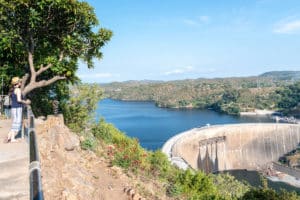
The economic link between fashion legend Gucci and forests in the wilds of Africa is likely to get weaker this year.
The reason is trade between big companies like Gucci and Nestle and the voluntary carbon market is ebbing.
Companies cutting back.
The companies are cutting back on the amount they are buying on the voluntary carbon market, leading to a decline for the first time in seven years.
“Gucci is in the process of reviewing its climate strategy and commitments with a view to achieving the most positive overall impact,” a spokesperson for the company said in an emailed statement.
Boom times predicted.
Just over a decade ago, the voluntary carbon market was as fashionable as a pair of Gucci shoes when it came to mitigating greenhouse gas emissions.
In the days when the carbon market was growing,analysts were predicting a boom market. Conferences up and down the African continent lauded the plan to alleviate climate change by financing the cutting of carbon emissions in developing countries.
Falling confidence.
But falling confidence in the market and questions over carbon offset credits have seen this market fall.
It has always been seen as a strange solution to climate change.
It is a bit like paying someone else to give up smoking for you.
The deal is that wealthy companies in the northern hemisphere – like Gucci with its heavy use of fibre and waste – can buy carbon credits that fund offset projects like the planting of trees to cut down the emission of greenhouse gases.
Less capital on the ground.
Fewer companies buying carbon credits from the market will mean countries like Kenya and Zimbabwe will have less capital with which to bankroll their tree planting projects.
One of those was a huge forest in an area called Songo near Lake Kariba, near Zimbabwe’s border with Zambia. It thrived for more than a decade despite the country’s political and economic upheavals.
For years the project received hard cash from the purchase of carbon credits by companies like Gucci and Nestle.
Now it is likely the people who run the forest will have to think again .





